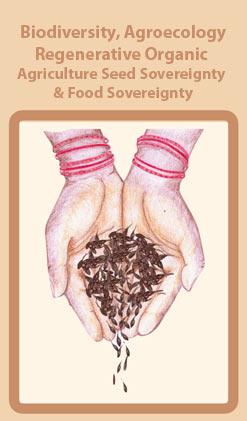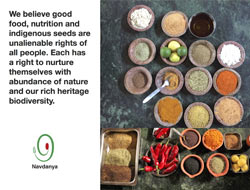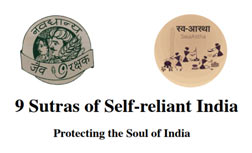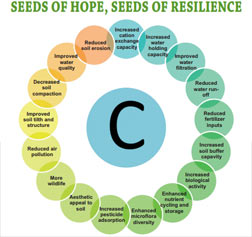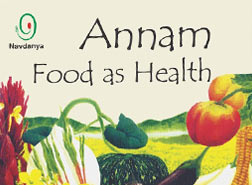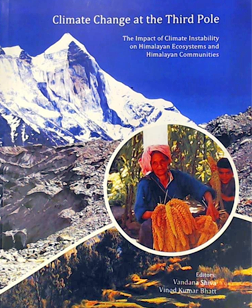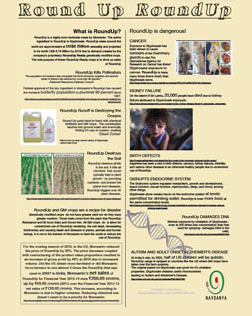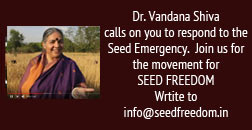Mr. Pawan Aggarwal, CEO FDA Bhawan, Near BalBhavan, Kotla Road, New Delhi 110002
Sub: Response to FSSAI’s New Labelling and Display Regulations 2018
India is a land of fresh, healthy, diverse food traditions guided by 5000 years of Ayurveda, the science of life, the science of eating good, diverse food for a healthy life. Food is Sarvaaushadi.
The labeling rules you have framed are anti-national, anti-public health, anti-science, anti-democracy.
They are anti-national because you are working against the order public in the context of food in India. You are legalising that which is illegal and criminalising our indigenous and healthy food cultures and local economies. 1.Illegal attempt to introduce GMOs in our diet
For example, you are trying to introduce GMOs in our diets through the backdoor, even though growing and importing GMOs is not allowed in India.
Your draft has a section.
Labelling of Genetically Engineered or Modified Foods All food products having total Genetically Engineered (GE) ingredients 5% or more shall be labeled. The total GE ingredients shall be of top three ingredients in terms of their percentage in the product. The labelling shall be as:
“Contains GMO/Ingredients derived from GMO” By introducing a clause that allows 5% GMOs in our food you are acting in violation of India’s laws, you are making decisions that are sub judice, are unscientific, and undemocratic. And by allowing 5% GMOs in our food to not be labelled, i.e. seen as GMO-free by consumers, you are misleading Indians about what they are eating, and denying them the Right to Know what is in their food. Further you are even going against dominant international standards that do not allow more than 1% GMO’s (See appendix). The only GMO food that was attempted in India was BtBrinjal. After the public hearings across the country, the Ministry of Environment put a moratorium on its cultivation and commercialisation. This decision was based on the democratic will of the Indian people. The GMO mustard is in the courts. All imports are regulated by Article 4 of RULES FOR THE MANUFACTURE, USE, IMPORT, EXPORT AND STORAGE OF HAZARDOUS MICRO ORGANISMS GENETICALLY ENGINEERED ORGANISMS OR CELLS, 1989 under EP Act, 1986 (4) These rules shall be applicable in the following specific cases; 1 (a) sale, offers for sale, storage for the purpose of sale, offers and any kind of handling over with or without a consideration; (b) exportation and importation of genetically engineered cells or organisms; (c) production, manufacturing, processing, storage, import, drawing off, packaging and repacking of the Genetically Engineered Products; You want to open the flood gates for GMO imports and not label them in total violation of the existing laws governing GMOs imports. Each import needs to go through an approval. What has not been approved cannot be granted a label. This is illegal. 2 Unscientifically treating food that is different in process and health quality as equal, hence misleading consumers and pushing them to unhealthy industrial diets based on artificial processes and chemicals There are many examples in your draft rules for labelling which are unscientific, misleading, and in fact a way to force unhealthy industrial foods on Indian citizens, and rob them of their healthy options of indigenous healthy foods. Example 1 Gluten Your proposed rules state Labelling of ‘Gluten Free’ and ‘Low Gluten’ The term “Gluten Free” shall be printed in the immediate proximity of the name of the product in the case of products described in regulation 2.14 of the Food Safety and Standards (Food Products Standards and Food Additives) Regulations, 2011, namely The term “Low Gluten” shall be printed in the immediate proximity of the name of the product in the case of products described in regulation 2.15 of the Food Safety and Standards (Food Products Standards and Food Additives) Regulations, 2011, namely: The label shall carry a ‘warning’ that ‘the food labeled as Low Gluten may pose a risk for those with celiac. India is not the USA where industrially bred wheats have led to gluten allergies and celiac disease. Desi Indian wheats do not cause gluten allergies. That is why, in an act of biopiracy, Monsanto tried to take a patent on Indian wheat ( Patent No 0445929 B 1) to try and get a monopoly on the market created by the growing gluten allergy epidemic. We challenged the biopiracy patent and it was dropped. Industrial breeding and industrial production of wheat based on uniformity, combined with industrial processing which damages the structure of wheat has led to an epidemic of gluten allergy. India’s wheats have been bred for diversity, and healthy eating. Our flour, until recently, was ground artisanally, and was whole flour with all nourishment intact. Industrial flour, called “refined” and “enriched”, has been stripped of its nutrients and fibre. Synthetic nutrients are then put put back in the flour. To make flours white, they are bleached with chlorine or peroxide. Bleached flours are less digestible than whole wheat flours. Industrial bread uses an amino acid, L –cysteine, in the dough to create even spaced air pockets, which improves the texture after the dough comes out of large industrial plants. This chemical is made from human hair and duck feathers. It can lead to cancer and allergies. As local stone ground milling was destroyed and replaced by roller mills, long distance transport and long shelf life became necessary. The perishable, but most nutritious part of wheat, the wheat germ was removed. The loss of the germ and the bran removed the most nutritious parts of the wheat grain, and with it the loss of B vitamins, calcium, iron, phosphorus and magnesium. After the epidemic of diseases linked to vitamin deficiency, now fortification is being offered as a pseudo solution to the health crisis created by industrial processing. Industrial processing creates nutritionally deficient wheat flour, and nutritional enrichment is an attempt to compensate for the nutritional loss. The industrial processing of wheat also adds to the degradation of food. Anthony Wilson refers to the products of factory processing as “Pseudo Foods”, because the methods used have different consequences for our body than artisanal processing. Extrusion cooking, explosion pressurisation, in sanitisation are all processes to which food is subjected at extremely high temperatures and pressures, leading to structural changes in the food, which in turn has consequences on health. You have a section on fake fibres which will destroy the fibre rich whole food flours of diverse grains in our diets and accelerate the chronic disease epidemic that is already a heavy health burden on Indian citizens since junk foods and industrial foods entered India. “dietary fiber” means carbohydrate polymers with a degree of polymerization (DP) not lower than 3, which are not hydrolyzed by the endogenous enzymes in the small intestine of humans. Dietary fiber consists of one or more of (A) Edible carbohydrate polymers naturally occurring in the food as consumed (B) Carbohydrate polymers, which have been obtained from food raw material by physical, enzymatic or chemical means (C) Synthetic carbohydrate polymers. This is a recipe for substituting our diverse and healthy fibres in vegetables and attas from diverse healthy, nutritious grains with Fake Food. We will not accept Fake Food label as safe. The degradation of our diets has gone hand in hand with the spread of industrial food and industrial food processing. We need process labelling that clearly describes the process of production and processing, not unscientific product labelling based on equating of unhealthy foods and healthy foods, hiding the health hazards of fake food and also the health benefits of real food. Example 2 Fats India, the land of rich biodiversity of edible oils -mustard, sesame, coconut, linseed, groundnut etc., is now 70% dependent on imports of palm oil, and GM soya oil. Solvent extraction plants use a neurotoxin, hexane, to extract the oil from soya or oil palm. In 1998 we did a “Sarson Satyagraha” to protect the indigenous diversity of our oilseeds and edible oils. Our artisanally processed coconut and mustard oils are now being recognised as healthy, in spite of all the pseudo scientific propaganda against our edible oils for decades by the industrial food processing lobby which has been promoting transfats in the diet, while displacing healthy oils and fats, through their influence on food policy, trade policy, scientific research, and the huge money they spend on misleading advertisement. Transfats help increase the shelf life of processed food, and allow processed food to stay solid at room temperature. According to a 2012 study published in the Annals of Internal Medicine, a mere forty calorie per day increase in transfats increases the risks of heart disease by 23%. The Centre of Disease Control has also attributed heart attacks to transfats. Transfats were originally invented to make candles, but Proctor and Gamble bought the patent and started to use it to produce cheap food. Around the world transfers are being removed from food. Trans fats have been shown to increase the risk of coronary artery disease in part by raising levels of the lipoprotein LDL (often referred to as "bad cholesterol"), lowering levels of the lipoprotein HDL (often referred to as "good cholesterol"), increasing triglycerides in the bloodstream and promoting systemic inflammation You have equated these inedible products which are unfit for eating with our healthy oils and fats when in your draft you write ‘fat’ means total lipids including saturated fat, monounsaturated fat, polyunsaturated fat and trans fat. Through this unscientific reductionist labelling that hides the process and health impact you are promoting hazardous trasnfats and equating them with our health artisanal cold pressed pure edible oils. You are thus attempting to both take away healthy food options from he Indian Citizens and imposing unhealthy industrial foods on them. Example 3 Sugars In your draft you have unscientifically defined sugars in terms of chemical reductionism , instead of the quality and the difference For sugars your draft rules write ‘sugars’ means all monosaccharides (glucose, fructose, etc.) and disaccharides (maltose, sucrose, lactose, etc.). However gur is very different in the process of production, the quality and the health impact from industrial sugar and fake sugars such as High Fructose Corn Syrup . Processed white sugar ,when consumed, is damaging to our health . Depleted of all the nutrients which are present in sugarcane and its artisan ally processed products such as gur and khan sari, refined white sugar is empty food . It is at the root of many metabolic disorders and chronic diseases . Unlike white sugar which is detrimental to health ,gur is full of goodness and has complex sugars. I tsp contains 4-5 mg of calcium , 48 mg potassium , 8 mg magnesium , 2-3 mg phosphorous , 0.5 mg iron and traces of copper , zinc as well B vitamins and niacim .It is recommended to those who suffer from asthma , joint pain and acidity . Its cleansing properties are well known There are numerous other health benefits. High Fructose Corn Syrup (HFSC) is increasingly being used as a sweetener for industrial soft drinks and sweets. Coca Cola and Pepsi Cola are leading users of HFCS which is contributing to a major disease epidemic. A study published in the International Journal of Obesity found that in the 35 years since the introduction of HFCS, the rise in obesity has paralleled the increase in use of HFCS. HFCS leads to skyrocketing of insulin production, while it suppresses the response to leptin which regulates the appetite. With the disruption of its regulatory mechanisms, the body starts to store fat and obesity is the result. Soft drink companies also use additives to colour. The artificial caramel colouring in colas is made by heating ammonia and sulphites under high temperature - which produces a cancerous substance called v4 methylimidazole (4 -MEI). In 2007, a US government study concluded that 4 MEI caused cancer in mice. A 2011 study by the International Agency for Research on Cancer determined that the chemical is a probable carcinogen. By equating health and unhealthy, natural and artificial sugars in your labelling rules you are hiding the hazards of industrial sugar and synthetic sugars .You are also hiding the benefits of our pure, artisanal sugar products like gur. You are therefore denying Indian citizens their right to healthy food and Indian artisans in the good food sector of their right to livelihood. Through your labelling rules you have reduced food, which we refer to as Annam Brahman, to fake degraded food which is degrading our health. Your draft is an assault on Indian civilisation and its rich knowledge and heritage of biodiversity, food, and nutrition. By imposing un scientific labelling on the local , small scale ,indigenous , artisanal , swadeshifood economy you are spelling a death knell for for healthy food culture and economy. You are continuing the MNC conspiracy against India that was started when our ghaniswere shut down to import GMO soya in 1998 through a “packaging order”. We had to undertake a Sarson Satyagraha to bring our healthy oils back. The rules you write tried to shut down Gandhi’s Ghani. We had to do a Satyagraha to save Gandhi’s Ghani. The current rules you have drafted are a continuation of this MNC assault on India. And clearly, the only interest kept in your minds, in the framing of these rules, is foreign. Indians deserve to grow, produce , distribute which spreads well being through good food for all, instead of bad food and fake food imposed by your unscientific , undemocratic , anti national labelling rules for the profits of the GMO and junk food industry at the cost of people’s health and our national food and health sovereignty , our ANNA SWARAJ We call on you to withdraw these draft rules which are nothing more than rules for establishing an MNC empire of unhealthy, hazardous , fake foods . Before you rush to impose anti national anti national food rules to dismantle the most sophisticated good food civilisation in the world , we call on the government to : 1 Create an independent on Food and Health Commission with women and mothers ,consumers , Ayurvedic experts, public health experts ,doctors , nutritionists , artisanal producers to frame the direction of the future of food for health in India on the basis of our time tested Ayurvedic system and the best in emerging independent public health science and the ecology of food including its impact on our gut biome. 2 Explore more sophisticated labelling that is related to health rights of consumers which informs them of the process and the source of food, instead of misleading reductionist labelling that hides real information about health and quality and is designed only to expand markets and profits for the fake food, junk food industry 3 Do an interdisciplinary and multi stakeholder assessment by of the social and ecological impacts if your draft is implemented , including the increase of plastic and aluminium waste and garbage . What would the impact be on increasing the unemployment crisis , the chronic disease crisis , and the garbage problem.Swachh Bharat is basedSwachhBhojan , on food that healthy and fresh and local , free of pesticides and untested chemicals . 4 Exclude the small scale artisanal sector from any centralised industrial labelling system and recognise Anna Swaraj standards for healthy, diverse, quality food . We will cooperate with local communities to evolve their Community Quality and Health principles for good food and our food culture and heritage. If the government fails to protect India’s food sovereignty and food heritage, the right of every Indian to good food for health , and imposes bad food from MNCs through these rules , we will be compelled to follow in Gandhi’s footsteps and call for an ANNA SATYAGRAHA to defend our diverse, fresh, local and non chemical processing and our food sovereignty and food freedom, our health, our livelihoods , our sophisticated time tested food cultures and heritage. For India’s freedom, for our health, for Anna Swaraj. DrVandana Shiva Appendix: Countries with GM labels (Minimum amount required to label) Australia (0.9%) Latvia (0.9%) Austria (0.9%) Lithuania (0.9%) Luxembourg (0.9%) Belgium (0.9%) Malaysia (1%) Bolivia (ND) Mali (ND) Bosnia and Herzegovina (0.9%) Malta (0.9%) Brazil (1%) Mauritius (ND) Bulgaria (0.9%) Netherlands (0.9%) Cameroon New Zealand (0.9%) China (1%) Norway (0.9%) Croatia (0.9%) Peru (ND) Cyprus (0.9%) Poland (0.9%) CzechRepublic (0.9%) Portugal (0.9%) Denmark (0.9%) Romania (0.9%) Ecuador (ND) Russia (0.9%) El Salvador Saudi Arabia (0.9%) Estonia (0.9%) Senegal (ND) Ethiopia (ND) Slovakia (0.9%) Finland (0.9%) Slovenia (0.9%) France (0.9%) South Africa (1%) Germany (0.9%) South Korea (3%) Greece (0.9%) Spain (0.9%) Hungary (0.9%) Sri Lanka (1%) Iceland (0.9%) Sweden (0.9%) India (5%) Switzerland (0.9%) Indonesia (1%) Taiwan (ND) Ireland (0.9%) Thailand (ND) Italy (0.9%) Tunisia (ND) Turkey (0.9%) Jordan (ND) Ukraine (1%) Kazakhstan (0.9%) United Kingdom (0.9%) Kenya (1%) Vietnam (ND) ND:Not determined. GM crops • Algeria: Cultivation banned. Imports banned. • Austria: Cultivation prohibited. Imports allowed. • Azerbaijan: Cultivation banned. Imports allowed. • Belize: Cultivation banned. Imports allowed. • Bhutan: Cultivation banned. Imports banned. • Bosnia and Herzegovina: Cultivation banned. Imports allowed. • Bulgaria: Cultivation prohibited. Imports allowed. • Croatia: Cultivation prohibited. Imports allowed. • Cyprus: Cultivation prohibited. Imports allowed. • Denmark: Cultivation prohibited. Imports allowed. • Ecuador: Cultivation banned. Imports allowed. • France: Cultivation prohibited. Imports allowed. • Germany: Cultivation prohibited. Imports allowed. • Greece: Cultivation prohibited. Imports allowed. • Hungary: Cultivation prohibited. Imports allowed. • Italy: Cultivation prohibited. Imports allowed. • Kenya: Cultivation prohibited. Imports banned. • Kyrgyzstan: Cultivation banned. Imports banned. • Latvia: Cultivation prohibited. Imports


